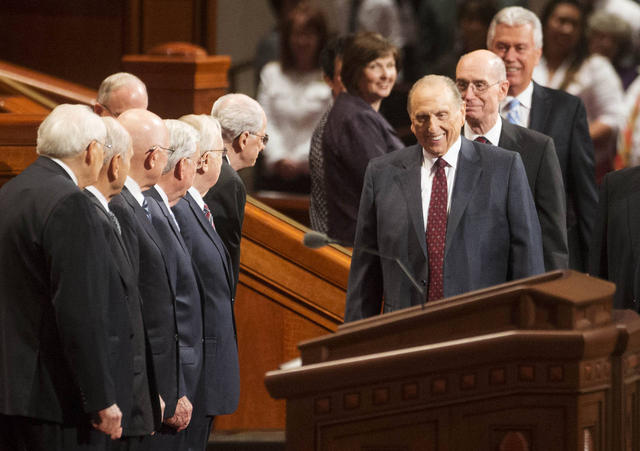Question
Gramps,
I would like to prove to my boss that unrighteous dominion applies to the work place as well as in the home. He is a Bishop and a temple officiator as well. But the two worlds are not the same. I need to show him that it applies to everything.
Jon
Answer
Jon,
In the gospel of Jesus Christ any principle our Lord taught applies to every aspect of our lives. The Lord’s commandment to love and the evidence love provides that we are Christ’s disciples doesn’t end when we enter the work force. When the Lord said, “By this shall all men know that ye are my disciples, if ye have love one to another.” In every aspect of our lives (e.g. family, work, church, friendship, et cetera) this principle of love is true — unrighteous dominion is an action which removes love from our hearts.
I have often pondered a particular notion ever since my ears heard a phrase spoken by businessman, particularly LDS businessman, “Business is business.” I find it ironic how easily church members, or anybody else, use a phrase that magically removes our accountability before the Lord when “business is business.” The phrase assumes as long as business is business my actions do not reflect my religious beliefs, and my actions do not have any affect on my spirit or character — because, business is business. This is simply untrue. The adversary loves it when the sons and daughters of God come up with, or simply accept, phrases which deny our accountability before God because of circumstance, or positions we hold.
In July of 1989, Elder H. Burke Peterson, provided an excellent talk regarding some personal questions regarding unrighteous dominion as applied to our roles as father and husband; although we can apply these principles in our employment at work.
The first, “Do I criticize family members more than I compliment them?” The question applied to ourselves, “Do I criticize [my employees] more than I compliment them?”
The second, “Do I insist that family members obey me because I am the father or husband and hold the priesthood?” When applied to ourselves, “Do I insist that [my employees] obey me because I am [their boss or manager because I have authority]?”
A third question, “Do my children seem reluctant to talk to me about some of their feelings and concerns?” As we apply words of truth to ourselves again, “Do my [employees] seem reluctant to talk to me about some of their feelings and concerns?”
The fourth question Elder Peterson asks us to ask ourselves, “Do I attempt to guarantee my place of authority by physical discipline or punishment?” A boss might ask, “How often do I threaten an employee’s job to guarantee my place of authority?” Now let’s be fair, some employees, at times, do need to be reminded they are employed for specific responsibilities and need to accomplish these responsibilities to stay employed. The balance between a power threat and a true recognition of what the employee was hired to do is the emphasis.
As we ponder these questions pertaining to unrighteous dominion and proper application, likening them to our lives, Elder Peterson then inspires us by saying,
“If the answer to any of these questions is yes, then we may need to evaluate our relationship with our family members. For one who holds the priesthood, the best test as to whether he is trying to control the lives of family members can be found by examining his relationship with the Lord. If a man feels a reduction or withdrawal of the Holy Ghost (manifested by contention, disunity, or rebellion), he may know that he is exercising unrighteous dominion.”
Although I have provided some food for thought, I wonder the reason why you think/feel you might prove anything to your boss. Please don’t misunderstand my thought, because I think it wonderful that you are hoping to help an individual recognize truth. My concern, what impact will your efforts have on your employment? Although LDS, not many men enjoy their weaknesses being pointed out, especially those who hold positions of authority and power. I once worked with a man who would say, “I am usually right, and rarely am I wrong, but when I am wrong I will admit it.” This is a great statement, however, when confronted with an opportunity to validate his statement when an individual pointed out his error — he rarely admitted his wrong and the individual who pointed it out (if not his best friend) would have a difficult time at work, if not be fired later on down the road (yes, this boss is LDS, reads his scriptures, writes in his journal weekly). As a word of caution be thoughtful, mindful, if you are truly going to share these things with a man/boss who could let you go for any reason, which will effect your ability to provide for your family. His position in the church doesn’t mean he will act well.
Gramps







